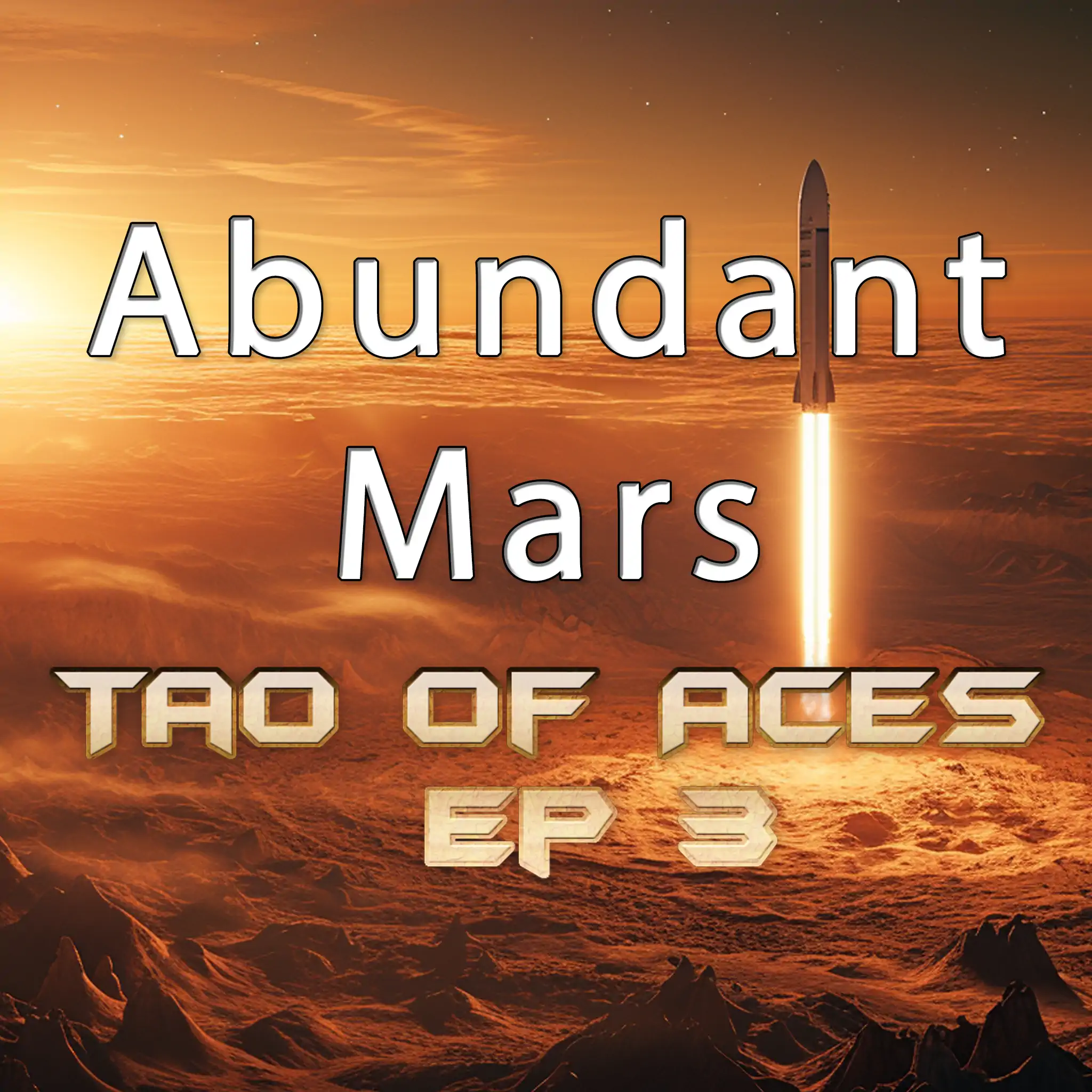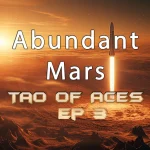

Listen here or on:
Spotify, Soundcloud,
The full script is available here or on Github.
In this episode I summarise the last two episodes, explain the Pyramid structure of current society then importantly I explain the first 3 Tao of ACeS (out of 10+2). Those being:
1. Have an Abundance Mindset
2. Be Responsibility Based
3. Aim for a Reduction Target.
I also give a basic meta analysis of the Tao points before giving John’s story.
Main Abundant Mars website: https://www.abundantmars.com/
Episode Link (this page): https://www.abundantmars.com/podcast/abundant-mars-episode-3-tao-of-aces-1-3
YouTube Playlist: https://youtube.com/playlist?list=PLdBvNR5aPXuW2i7hnXMur_fQKHfnMym_A&si=jZxAs2bzvVs7fr7N
YouTube: https://www.youtube.com/watch?v=z0Fd6OPislI
The core tenets of an abundance Centered Society are:
- Have an Abundance Mindset – Creating abundance through Cradle to Cradle, systems design, Access Abundance, and Automation.
- Be Responsibility Based – You should look after the systems that support you and your fellows.
- Aim for a Reduction Target – Try to reduce needless violence, waste and stratification.
- Use the Scientific Method – We want to pursue abundant knowledge, but apply it ethically/
- Expect in Dynamic Equilibrium – We should expect change, just as our Universe is always changing.
- Transition towards Dataism – With enough data we can have previous examples to go on, and select the best course of action, even if it goes against our instincts and emotions. This is the next stage beyond Humanism.
- Be Integral – This is about understanding yourself and how to reason, in order to increase your personal sensemaking. This includes psychometric profiling systems like the OCEAN model and Spiral Dynamics Integral.
- Be in the Intelligence Quadrant – Try to be in the intelligence quadrant, where you do things that are good for you and for good others.
- Use Collective Sense making – This is about taking your perspectives and merging them with others to better understand an issue. It’s also about trying to expand empathy towards all living beings.
- Use Collective Decision Making – This is about selecting the best decision making framework and synthesising the best decisions given the constraints.
- Add Your Own – 11 and 12 are bonus Tao’s for you to work out, either individually or collectively in the future.
Tao #1 Abundance Mindset (summary)
An abundance-centered society aims to provide the necessities of life – such as air, water, food, shelter, electricity, transportation, education, health, and entertainment – freely to everyone on the planet.
It utilizes strategies like:
- Access abundance – Sharing goods and services to reduce the need for individual ownership (ex: using community tool sheds, public transportation, high quality equipment).
- Cradle to Cradle – Closed-loop production cycles where products are designed to be remade into new products.
- Automation – Using technology to reduce needless human labour.
- Systems Design – Redesigning entire systems, not just optimizing existing processes. Starting from first principles rather than just tweaking current systems.
- Tracking Materials – Keeping track of technical nutrients (reusable materials) and biological material through their use cycles.
- Algorithms – Using transparent and updateable algorithms to allocate resources rather than traditional politics.
- Reduced Running Costs – Prioritising lower long-term operating costs over higher upfront costs.
An Abundance Centered Society (ACeS) frees people from basic survival so they can pursue mastery, self-actualization, and enjoyment rather than being stuck in monotonous work. It values imagination, application of the scientific method, and upgrading systems when needed.
The goal is increasing abundance for all while remaining within ecological limits.
Tao #2 Responsibility Based (summary)
Responsibility to Systems – You have a responsibility to support the ecosystems, social systems, and technical systems that sustain you.
- Ecosystems – The natural environment that provides essentials like air, water, food. We must protect nature to ensure our survival.
- Technical systems – Infrastructure, goods, services. Automate and improve efficiency.
- Social systems – Institutions, culture and governance. Refine based on new values.
You should do your part based on your skills and availability. Find the right balance of production (creating goods/services) and production capacity (personal growth).
Aim for right tension – Like tuning an instrument string. Over- or under-exertion is unhealthy. Recharge properly.
Contribute in ways that scale impact. E.g. Inventing elevators helps millions vs helping one person up the stairs daily. Your status is based on merit – how you contribute to society’s well-being. Not material possessions.
Support and upgrade systems. Reduce the need for human labour via automation and design. But expect some manual work will always be needed.
Focus on increasing your capabilities and society’s capabilities, not just on doing tasks.
Tao #3 Reduction Target (summary)
Reducing Violence, Waste and Stratification
- Violence – Minimize needless violence in all forms – physical, emotional, financial, intellectual. Treat it like a contagious disease – interrupt transmission, prevent spread, change group norms. Some suffering is important for growth. Increase anti-fragility. Tolerate diversity. But don’t tolerate the intolerant.
- Waste – Reduce material, energy, time, emotional/mental waste. Use closed-loop systems to reuse, repair, recycle materials. Entropy prevents eliminating all waste but don’t waste needlessly. Especially remove bureaucracy and inefficiencies.
- Stratification – Reduce extreme inequality. People accept 3x difference between rich and poor but it’s 100x+ currently. Harms innovation and wellbeing even for the rich. “We all do better when we all do better.” Money buys happiness only to ~$120k/year. Too little or too much causes stress. In abundance society, financial motivation is replaced with a responsibility to the systems that support you.
Target reduction, not elimination. The aim is to pressure systems to improve.
Balance with abundance, tolerance and anti-fragility.
Some waste, violence, inequality will persist, but we can reduce needless amounts.
References:
Website: Tao of Backup http://www.taobackup.com/
Concept: Cosmo-localism https://wiki.p2pfoundation.net/Cosmo-Localism
Book: End Game – By Derrick Jensen https://www.goodreads.com/en/book/show/60971
Movie: The Triangle of Sadness https://www.imdb.com/title/tt7322224/
TED talk: Treat violence like a contagious disease – by Gary Slutkin http://www.ted.com/talks/gary_slutkin_let_s_treat_violence_like_a_contagious_disease.html
Book: The Spirit Level: Why More Equal Societies Almost Always Do Better – By Richard G. Wilkinson and Kate Pickett https://en.wikipedia.org/wiki/The_Spirit_Level_(book) with slides available at https://equalitytrust.org.uk/resources/the-spirit-level
Inequality facts: 104x income inequality as per 2020 stats, and 196x as much for 0.1% in 2018 and CEO to worker pay ratio being as high as 324x https://inequality.org/facts/income-inequality/
Concept: Goodhart’s law https://modelthinkers.com/mental-model/goodharts-law
Cradle to Cradle: Book: https://mcdonough.com/cradle-to-cradle/ TED talk – https://www.youtube.com/watch?v=IoRjz8iTVoo Documentary – Waste is Food https://www.youtube.com/watch?v=4pwCFH1LkCw
YouTube channel: Rebel Wisdom https://www.youtube.com/@RebelWisdom YouTube Playlist: Collective Sense Making https://www.youtube.com/watch?v=VkKnOEQlwl4&list=PLCA7IL3lkxbKVfUTc5k6reae8lHTDSZXO
Leave a Reply